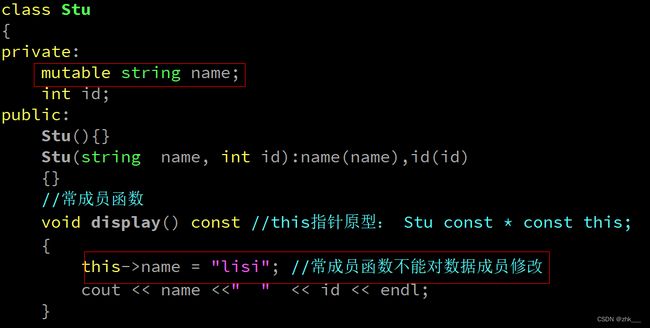嵌入式养成计划-38----C++--匿名对象--友元--常成员函数和常对象--运算符重载
八十七、匿名对象
- 概念:没有名字对象
- 格式 :类名();
- 作用
- 用匿名对象给有名对象初始化的
- 用匿名对象给对象数组初始化的
- 匿名对象作为函数实参使用
示例 :
#include 八十八、友元
88.1 作用
- 可以让其他一些函数或者类访问 另一个类的私有数据成员
- 友元关键字 : friend
88.2 种类
- 全局函数做友元
- 类友元
- 成员函数做友元
88.3 全局函数做友元
- 让全局函数访问一个类私有数据成员。
示例 :
#include 88.4 类做友元
- 一个类去访问另一个类的私有属性。
88.5 成员函数做友元
- 一个类里的成员函数去访问另一个类的私有属性。
88.6 示例
#include 88.7 注意
- 不要过度使用友元,会降低或者破坏封装性
- 友元不具有交互性,传递性,继承性。
八十九、const修饰的成员函数和对象(常成员函数、常对象)
- 类中所有的成员函数都可以对类中数据成员进行修改操作,
- 如果想设计一个成员函数不能对数据成员修改操作,则需要用const修饰的成员函数实现。
89.1 常成员函数
- 常成员函数 :表示该成员函数不能修改数据成员的值。
- 格式 :
返回值类型 函数名(形参列表) const { 函数体内容; } - 同名的常成员函数和非常成员函数构成重载关系,
- 原因:this指针类型不同
89.2 常对象
- 常对象表示这个对象的数据成员不能被修改。
- 格式: const 类名 对象名;
- 非常对象可以调用常成员函数,也可以调用非常成员函数,优先调用非常成员函数
- 常对象只能调用常成员函数,如果没有常成员函数,则报错
示例 :
#include 89.3 mutable关键字
九十、运算符重载
- 概念:
运算符重载就是对运算符重新定义,赋予另一种功能,以适应不同的数据类型。 - 每种运算符重载都有两种实现方式:
- 成员函数实现运算符重载
- 全局函数实现运算符重载
90.1 算术运算符重载
种类: + - * / %
表达式: L ? R (L 左操作数 ?运算符 R右操作数)
左操作数:可以是左值,可以右值,运算过程中不可以被改变
右操作数:可以是左值,可以右值,运算过程中不可以被改变
结果:右值 (不可以被改变)
- 算术运算符重载实现方式:
-
成员函数实现运算符重载
const 类名 operator?(const 类名 &R) const { 具体实现 }第一个const 表示结果是右值 不能被改变
第二个const 表示右操作数运算过程中不能被改变
第三个const 表示左操作数运算过程中不能被改变 -
全局函数实现运算符重载
const 类名 operator?(const 类名 &L, const 类名 &R) { 具体实现 }
-
示例 :
#include 90.2 关系运算符重载
种类: > 、 >= 、 <、 <=、 ==、 !=
表达式: L ? R (L 左操作数 ?运算符 R右操作数)
左操作数:可以是左值,可以右值,运算过程中不可以被改变
右操作数:可以是左值,可以右值,运算过程中不可以被改变
结果: bool类型
- 关系运算符重载实现方式:
- 成员函数实现运算符重载
bool operator?(const 类名 &R) const { 具体实现 } - 全局函数实现运算符重载
bool operator?(const 类名 &L, const 类名 &R) { 具体实现 }
- 成员函数实现运算符重载
示例 :
#include 90.3 赋值运算符重载
种类: = 、+= 、 -= 、*= 、/= 、%=
表达式: L ? R (L 左操作数 ?运算符 R右操作数)
左操作数:是左值,运算过程中要被改变
右操作数:可以是左值,可以右值,运算过程中不可以被改变
结果:自身的引用
- 赋值运算符重载实现方式:
- 成员函数实现运算符重载
类名 &operator?(const 类名 &R) { 具体实现 } - 全局函数实现运算符重载
类名 &operator?(类名 &L, const 类名 &R) { 具体实现 }
- 成员函数实现运算符重载
示例 :
#include 90.4 自增、自减运算符重载
- ++、- -
- 下面以自增为例,自减的话,换下符号就行了
- 前置自增
表达式 : ++O
操作数 : 左值,运算过程中要改变
结果 : 左值 自身的引用
前置自增运算符重载实现方式:
- 成员函数实现运算符重载
类名 &operator++() {} - 全局函数实现运算符重载
类名 &operator++(类名 &O) {}
- 后置自增
表达式 : O++
操作数 : 左值,运算过程中要改变
结果 : 右值,不可以被改变
后置自增运算符重载实现方式:
- 成员函数实现运算符重载
const 类名 operator++(int) // {} - 全局函数实现运算符重载
const 类名 operator++( 类名 &O, int) {}
示例 :
#include 90.5 插入、提取运算符重载
- 插入符 << (或者叫输出符)
- 提取符 >> (或者叫输入符)
- cout 是ostream 类对象,可以换成别的名字
- cin 是 istream类对象,可以换成别的名字
示例 :
#include 90.6 不可以重载的运算符
访问成员 .
指针访问成员 ->
作用域限定符 ::
三目运算符 ? :
sizeof()
...
..
.
小作业
- 整理代码
- 算术运算符
- 逻辑运算符
- 赋值运算符
我写的
#include 